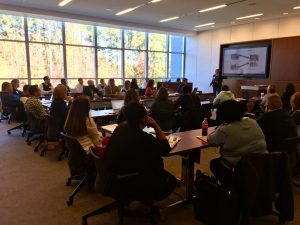
Without a doubt, working with teachers and educational leaders to understand education data is what I love most about my job. I have enjoyed engaging with these dedicated public servants and learned so much from our collaborations. One of the highlights of my role is planning conferences for EVAAS users, which offer unparalleled opportunities to engage and collaborate with educational leaders on the use of data, my favorite topic!
When folks ask me how I can get so passionate about education data, I wonder, “How you could not get passionate about data?” It is the science that drives the art of teaching. Passion for data permeates EVAAS user conferences, where outstanding educators lead sessions around using education data to drive change.
Here are some recaps from our two most recent conferences. As you begin the new year, I hope these ideas excite you about the use of school and student data to support overall school improvement and increase student progress.
School districts find data to be a powerful tool to ask meaningful questions.
Pender County (NC) Schools is a large, economically diverse and rapidly growing school district. After implementing data teams and creating a standard set of data tools and questions, they discovered that data helped complete the picture for improvement. Regardless of whether a school was socio-economically disadvantaged or affluent, highly proficient or struggling, answering set data questions helped each school focus on the areas of improvement to ensure every school was growing its students. Although the answers to the data questions were unique to each school, starting the conversation with guided questions helped school leaders become more comfortable with the data. Ultimately, the questions and reflections helped school leaders implement the best changes to drive student progress. What are the questions you can ask of your education data to help guide reflection?
School leaders find data instrumental in growing educators professionally.
A school leader for Darlington County (SC) Schools shared that she uses data to facilitate professional growth conversations with her staff. The data allows for more objective teacher conferences and helps shape the type of professional development each teacher receives. Data serves as a flashlight to guide overall school improvement. How can data help your district and school provide the best professional development for educators? We differentiate for students daily. Imagine the professional growth that can happen if we are willing to differentiate for our teachers!
Teacher leaders find data to be a powerful tool for reflection.
One teacher noted, “Today I learned how much I don’t know about using data. I also dispelled a few myths and have grown my list of things to learn more about. Thank you for this opportunity to grow professionally.” She continued, “Data helped me be a better teacher. I was able to reflect on the past, set new goals for myself, and gain valuable insight on my students.”
Student projection data is a game changer for students.
District leaders from Charlotte-Mecklenburg Schools, a large, urban school district in North Carolina, shared how having access to student projections was so powerful. Student projections allow for them to open doors for students by placing them in more rigorous courses. It also allows for educators to provide enrichments and interventions for all students. Having access helps them know where they are and to create the best plan to reach their goals. How are you using student projection data to open doors for your students? How can you use this data to ensure that every student’s needs are met?
I hope this recap is a helpful tool for reflection. How will you use your education data to spur improvement?
